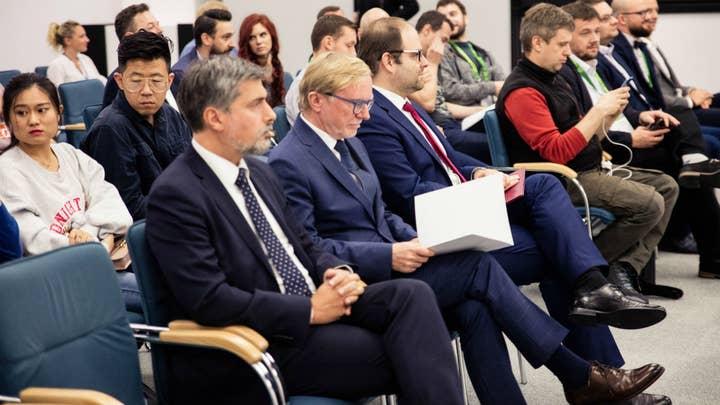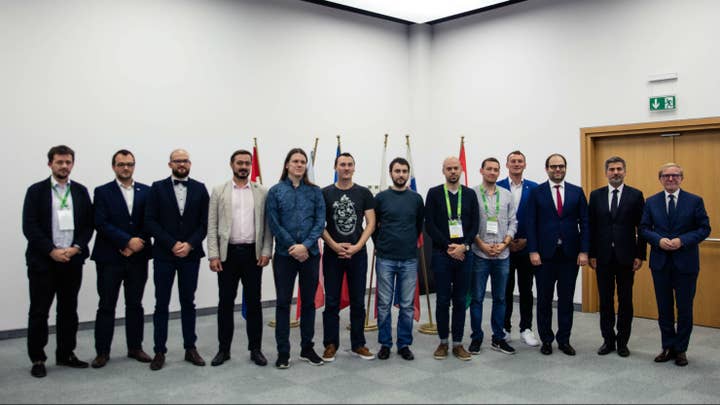Eastern European developers seek growth through solidarity
At Poland's Games Industry Conference, six European developer associations pledged to work together to achieve their goals
The developer associations from six countries in Central and Eastern Europe have made a formal agreement of collaboration, in order to remain competitive in the global games business and have a greater impact on EU policy making.
At an official ceremony at the Games Industry Conference (GIC) in Poznan last week, representatives from the Polish government gathered to witness the signing of a "letter of intent" by the developer associations for Poland, Czech Republic, Hungary, Croatia, Slovakia and Moldova. The most senior government figure at the ceremony was Paweł Lewandowski, the Minister for Culture and National Heritage, who advised the GIC audience of the need to recognise that "video games are not just toys."
"They are an interactive medium that is gaining in importance and growing in popularity - a splendid way of expression, telling stories and involving users' senses and emotions," he said. "Video games should be considered as a form of art; that's why the games industry is attached to the Ministry of Culture and National Heritage in Poland."
"I dearly hope that this is just the beginning"
Paweł Lewandowski, Minister for Culture
GIC runs in tandem with Poznan Game Arena (PGA), providing a focal point for both Polish developers and Polish consumers. According to Lewandowski, the organisers of GIC and PGA were "awarded" this year by the government for their role in promoting digital culture and the country's growing games industry. This growth is exemplified by companies like Techland and, most of all, CD Projekt, the success of which contributed towards the apparent political goodwill towards video games in Poland.
"I am strongly convinced that this letter of understanding that we are about to sign will open up new paths for fruitful co-operation," Lewandowski said. "It will also greatly contribute to the reinforcement of the games industries in Central and Eastern europe... I dearly hope that this is just the beginning."
The event was hosted by Jakub Marszalkowski, the co-founder of the Indie Games Poland Foundation and the head of GIC. Just before he invited the leaders of the various developer associations to sign the letter of intent, he expressed the need to make the markets in their countries "more accessible" to one another, and to "exchange knowledge and education, and share experiences."

GamesIndustry.biz spoke to Marszalkowski this week, to further explore the intentions behind this collaboration. He said that, Moldova aside (which has only recently started to be in regular) the nations involved have always worked together on "small projects" - ensuring that developer events are well supplied with speakers, for example, or giving space to a Croatian game at a Polish expo pavilion. According to Marszalkowski, Poland and Hungary run a game jam themed around the close relationship the two countries have long shared.
"We have a long-running Polish/Hungarian friendship throughout history," he said. "So we do a friendship game jam: 20 Polish developers went to Budapest to [make] games together with 20 Hungarian developers. The games touch on parts of our common history."
While there has been collaboration of various kinds for years, the six associations agreed that they "would like to do more, and more in an official way." The document was signed in Poland, of course, which has the largest industry out of the six countries involved - at least 400 studios, according to Marszalkowski. However, it represents a solidarity in terms of the challenges that all six associations involve face. In an industry where marketplaces are so open and global, it can be easy to forget that some countries have a competitive advantage when it comes to building on success.
"For a developer from Eastern Europe to get to GDC? It's almost not possible"
Jakub Marszalkowski
Marszalkowski points to a research grant that Polish developers can apply for - not to mention the support Indie Games Poland receives from the government - as an example of help available in Poland that does not exist in, say, Moldova. However, the benefits of being in Poland are still nowhere close to the assistance provided to developers in other European countries - the UK, for example - not to mention the huge deficit in annual salaries. For most studios in Eastern Europe, Marszalkowski said, attending a show like Gamescom is "crazy expensive," while visiting the major events in the US is virtually a pipe dream.
"For a developer from Eastern Europe to get to GDC? It's almost not possible if they don't get some big support from their company. The cost of doing it on your own is very, very high."
Marszalkowski added: "Politicians support the game industry in Poland, but not really that much in other countries... Sadly, when we look at the countries around [Eastern Europe], and the participants in this agreement, there is not that much happening."
Having talked to many developers across several days in Poznan, the sense that an imbalance exists between the output of the local industries in this part of Europe and their visibility is hard to miss. Marszalkowski was just one of several voices to make the point, positing that showcases and scholarship programmes supposedly representing the whole of Europe are often weighted towards France, Germany, the Netherlands and the Scandinavian countries. This is not a problem specific to games, he said, but a "more general problem" that is nevertheless evident in the industry.

"The Iron Curtain, at least in [people's] minds, is still standing, and it's affecting things," he said. "Getting people from big, important partners to visit the companies in Eastern Europe is more difficult... We definitely need to work on impact, we definitely need to work on visibility.
"We want to strengthen the bonds that we have, and move towards something more formal in the future. Right now it's a letter of intent, but the cooperation is ongoing and we would like to have more. Maybe the other countries can use that to push their politicians... to be more supportive [of the games industry]."
"The Iron Curtain, at least in [people's] minds, is still standing, and it's affecting things"
Jakub Marszalkowski
Political support and understanding is a key aspect of the thinking behind the collaboration. There is a sense that, having gained ground on the leaders of the pack, the countries of Eastern Europe cannot afford to fall further behind. When Marszalkowski sees a figure like Angela Merkel attend Gamescom, he sees it as a positive thing for the industry as a whole, but also evidence that yet another European country may be about to get a huge boost from its government.
"It is another important signal," he said. "Another signal that this is happening almost everywhere."
The possibility of all six governments offering financial and structural support to their national industries is likely a long-term ambition of the collaboration. In the immediate future, though, it will give all six nations a stronger position when representing themselves in a European Union that often fails to recognise the economic divide between its various member states.
At the official signing, Marszalkowski mentioned the price of goods as an example; another issue that causes problems "with almost everything," but is a very real concern for those making games. As Marszalkowski explained, a Polish gamer has to pay the same price for a game as their equivalent in a country where annual salaries may be as much as four times larger; an absurd situation on the face of it, and one that is better tackled by six voices, with shared goals, speaking in unison.
"In the past there were issues with games, especially in the console market, being more expensive in Poland than in Western Europe," he said. "Right now, the EU is considering this digital single market, which is supposed to bring digital sales with the whole European Union to some common factor.
"Within that, we see quite a lot of dangers to both consumers in our region, and to developers in our region. If salaries are three to four times lower, having digital products forced to be sold at the same price as a Western market? That will do nothing good."
GamesIndustry.biz attended the Games Industry Conference and Poznan Game Arena as a speaker and a guest of the organiser.








